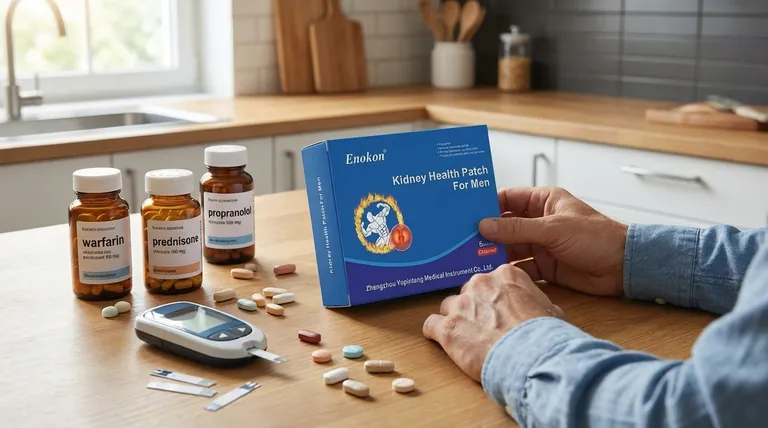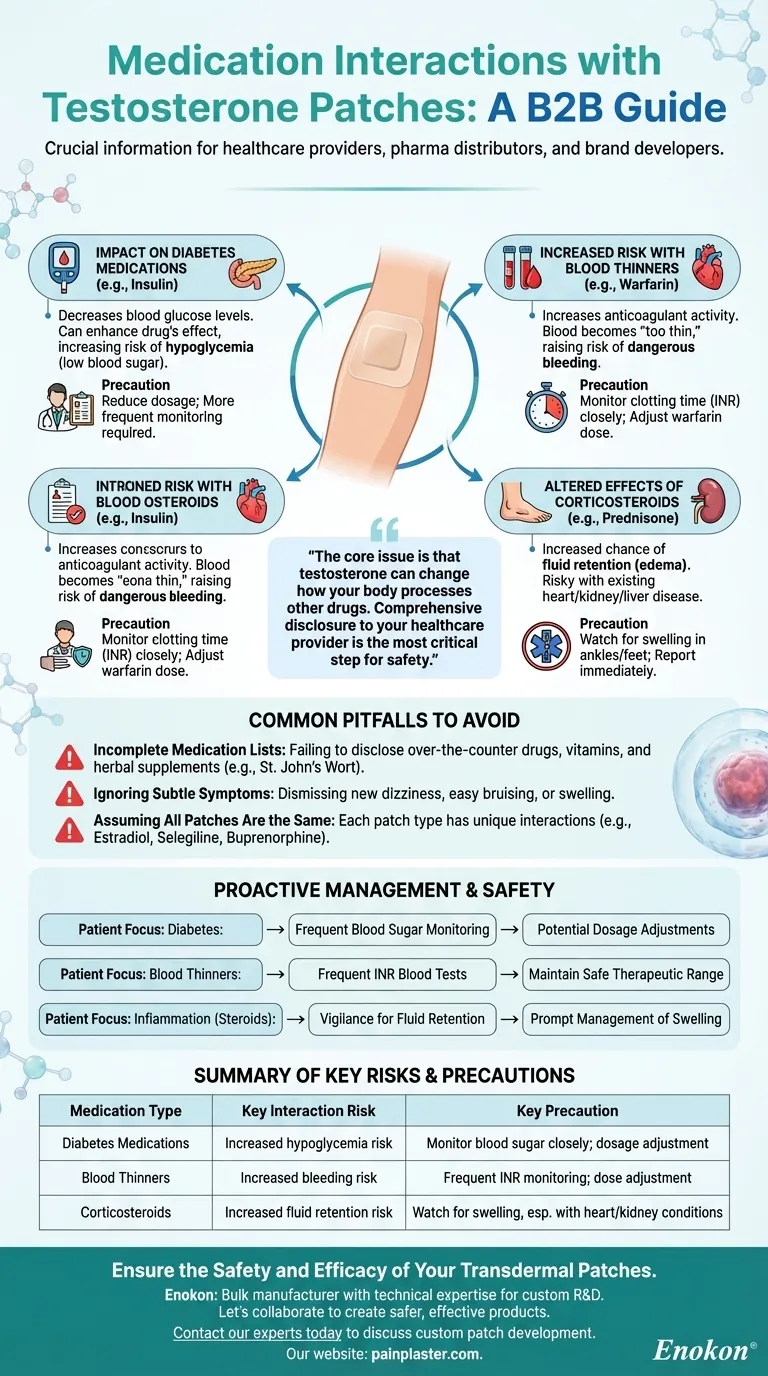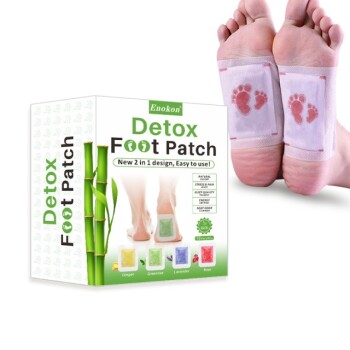When using testosterone patches, it is crucial to be aware of several key medication interactions. Specifically, medications for diabetes, blood thinners like warfarin, certain steroids such as prednisone, the anti-inflammatory drug oxyphenbutazone, and the beta-blocker propranolol can all interact with transdermal testosterone, potentially altering their effects and requiring dosage adjustments.
The core issue is that testosterone can change how your body processes other drugs. It can lower blood sugar, increase the effects of blood thinners, and compound the side effects of other steroids, making comprehensive disclosure to your healthcare provider the most critical step for your safety.

How Testosterone Alters Other Medications
Testosterone replacement therapy doesn't just impact hormone levels; it can have a cascading effect on other physiological systems. This is why its interaction with other medications must be carefully managed by a professional.
Impact on Diabetes Medications
Testosterone has been shown to decrease blood glucose levels. For individuals taking insulin or other oral diabetes medications, this can enhance the drug's effect, increasing the risk of hypoglycemia (abnormally low blood sugar).
Your physician may need to reduce the dosage of your diabetes medication and will likely recommend more frequent blood sugar monitoring when you start testosterone therapy.
Increased Risk with Blood Thinners
The most significant interaction is often with anticoagulants, or blood thinners, like warfarin. Testosterone can increase the anticoagulant activity of these drugs.
This means your blood may become "too thin," significantly raising the risk of dangerous bleeding or bruising. Your doctor must monitor your clotting time (INR) closely and adjust your warfarin dose accordingly.
Altered Effects of Corticosteroids
When testosterone is used concurrently with corticosteroids like prednisone or cortisone, there is an increased chance of fluid retention (edema).
This can be particularly risky for patients with existing heart, kidney, or liver disease. Swelling in the ankles or feet should be reported to your doctor immediately.
Common Pitfalls to Avoid
Safe and effective treatment goes beyond just knowing the drug names. It requires a proactive approach to your overall health management and transparent communication with your medical team.
Incomplete Medication Lists
The single biggest mistake is failing to provide your doctor with a complete list of everything you take. This includes not just prescriptions, but also over-the-counter medications, vitamins, and herbal supplements.
Even things like St. John's Wort can interact with various medications, and your provider needs the full picture to ensure your safety.
Ignoring Subtle Symptoms
Do not dismiss new or worsening symptoms after starting testosterone. Signs of an interaction can be subtle at first.
Pay close attention to dizziness or confusion (potential low blood sugar), unusual or easy bruising (potential blood thinner issue), or new swelling in your limbs (potential fluid retention).
Assuming All Patches Are the Same
While your question is about testosterone, it's important to understand that nearly all transdermal patches have potential interactions. Estradiol patches, selegiline patches for depression, and pain patches like buprenorphine all have their own unique lists of interacting drugs.
This reinforces the universal principle: every new medication, regardless of its form, requires a review of your current regimen.
Making the Right Choice for Your Safety
Your primary responsibility is to maintain open and honest communication with your healthcare provider. Your specific medical profile will dictate the necessary precautions.
- If your primary focus is managing diabetes: You must commit to frequent blood sugar monitoring and be prepared for potential adjustments to your diabetes medication dosage.
- If your primary focus is managing a condition with blood thinners: Expect to undergo more frequent blood tests to check your clotting factors, ensuring your dosage remains in a safe therapeutic range.
- If your primary focus is managing inflammation with corticosteroids: You and your doctor must be vigilant for any signs of fluid retention and be ready to manage it promptly.
Ultimately, proactive communication with your healthcare team is the key to safely integrating testosterone therapy into your health regimen.
Summary Table:
| Medication Type | Key Interaction Risk | Key Precaution |
|---|---|---|
| Diabetes Medications (e.g., Insulin) | Increased risk of hypoglycemia (low blood sugar) | Monitor blood sugar closely; dosage adjustment may be needed |
| Blood Thinners (e.g., Warfarin) | Increased anticoagulant effect, raising bleeding risk | Frequent INR monitoring and dose adjustment required |
| Corticosteroids (e.g., Prednisone) | Increased risk of fluid retention (edema) | Watch for swelling, especially with heart/kidney conditions |
Ensure the Safety and Efficacy of Your Transdermal Patches
As a bulk manufacturer of reliable transdermal patches and pain plasters, Enokon provides healthcare and pharma distributors and brands with the technical expertise needed for custom R&D and development. Whether you're formulating a testosterone patch or another transdermal solution, our team can help you navigate complex medication interactions and optimize your product's safety profile.
Let's collaborate to create a safer, more effective product for your patients. Contact our experts today to discuss your custom patch development needs.
Visual Guide

Related Products
- Prostate Pain Kidney Health Care Patch for Men
- Natural Herbal Wormwood Patch Pain Plaster
- Capsaicin Chili Medicated Pain Relief Patches
- Far Infrared Deep Heat Relief Patches Medicated Pain Relief Patches
- Heating Pain Relief Patches for Menstrual Cramps
People Also Ask
- What should be done if a dose of testosterone patches is missed? Regain Stability and Safety
- What lifestyle factors should be considered when choosing between testosterone patches and injections? Find Your Best Fit
- What should be done if a testosterone patch falls off? A Guide to Maintaining Hormone Stability
- How often should testosterone patches be applied? Daily Dosage & Best Practices
- What should be done in case of a testosterone patch overdose? A Step-by-Step Emergency Guide

















